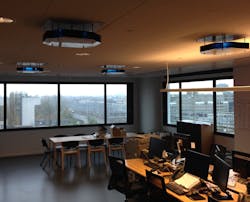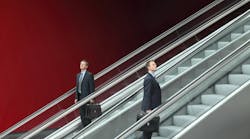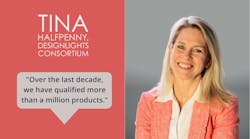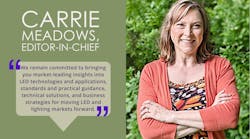—There was a curious moment late last month during a conference call and slide presentation by Signify CEO Eric Rondolat which raised some questions over how well the company's sale of UV-C products is going.
As a quick review, UV-C is the ultraviolet radiation — the invisible “light” — that at certain frequencies was proven early in the pandemic to deactivate the SARS-CoV-2 virus that causes COVID-19. A year ago, Signify quickly embraced the technology in conventional mercury vapor form (not LED), and was quick out of the gates with products spanning from UV-C tubes it provides to other manufacturers, to finished products including upper air UV-C luminaires to enclosed disinfection boxes for home use, among others.
During the call a little over two weeks ago, Rondolat was showing a slide singling out four business highlights in Signify's Digital Solutions division, which is the group that sells to commercial offices, warehouses, factories, stadiums, shopping centers, public spaces, and the like.
It came time to elaborate on the four: a UV-C validation and a corresponding installation at a London rugby stadium; a general lighting and marketing pact with the National Hockey League; a Li-Fi deployment at a conference center in The Hague; and an aquaculture installation in Holland.
Rondolat gave a lively update on the last three. But he completely skipped over the UV-C. It seemed to be a moment of conspicuous silence. If Signify had a rosy story to tell of UV-C sales, surely that was the time to open up about it.
So LEDs Magazine asked Signify afterwards whether the reticence belies any underwhelming UV-C numbers.
A spokesperson didn't exactly say yes or no. Rather, he explained that Signify leverages UV-C technology not only in the Digital division but also in its home division — called Digital Products — and also in its OEM business supplying what it calls UV-C “light sources” (remember, UV-C is not visible). Therefore, the spokesperson explained, it was prudent to avoid a UV-C discussion while talking about the Digital Solutions business, because “comments may be taken out of context.”
But when pressed for a UV-C outlook by Citi analyst Martin Wilkie, Rondolat did indeed indicate that UV-C sales to commercial spaces have been a bit more challenging than selling UV-C products to the home market, where it seems that Asia and the Middle East in particular are snapping up home UV-C lamps and disinfection boxes.
The challenging commercial market is something that Rondolat had mentioned three months ago on a similar financial results call. The situation seems not to have changed much since then, except that OEM sales have slowed down.
“We see our business still growing in UV-C (but) to a lesser extent than last year when it really exploded,” Rondolat told Wilkie. “We see also a different pattern in the portfolio that we are selling. Last year it was mostly light sources....But what we see now in our portfolio is that we are selling also more of the finished products.”
He then singled out the consumer market for being strong in finished UV-C products. By all appearances, it would appear that the commercial market is lagging.
“We see on the consumer side a very positive traction,” Rondolat noted. “On the professional side we have also developed new offers (but) it takes a bit longer in terms of commercial incubation because customers need to be educated on UV-C which carries a risk if you're exposed.”
Indeed, UV-C is harmful to the skin and eyes, so its use requires either that no one is present, or that the radiation is positioned in such a way so as to be shielded from people or pointed away from them.
“In the solutions that we bring to the market there's absolutely no risk of exposure,” Rondolat said. Signify has claimed that because its upper air UV-C products are positioned at height and are not pointing down, they are safe. The company has installed them at the rugby stadium and elsewhere, such as at German supermarket Edeka.
Rondolat also expressed optimism that UV-C sales will strengthen as new laws take hold requiring COVID-related health and safety provisions in the workplace. UV-C technology will also play a role as the public becomes more hygiene-aware not just in a COVID context, but also in regard to other viruses and bacteria.
“We think it's less of a sprint, and more of a marathon,” Rondolat said of the UV-C business potential.
Meanwhile, Signify will continue to face competition from other UV-C suppliers, some of whom unlike Signify are packing the technology in LED format. At the same time, other competitors are now beginning to offer virus-deactivating technology in visible-light format.
MARK HALPER is a contributing editor for LEDs Magazine, and an energy, technology, and business journalist ([email protected]om).
For up-to-the-minute LED and SSL updates, why not follow us on Twitter? You’ll find curated content and commentary, as well as information on industry events, webcasts, and surveys on our LinkedIn Company Page and our Facebook page.





